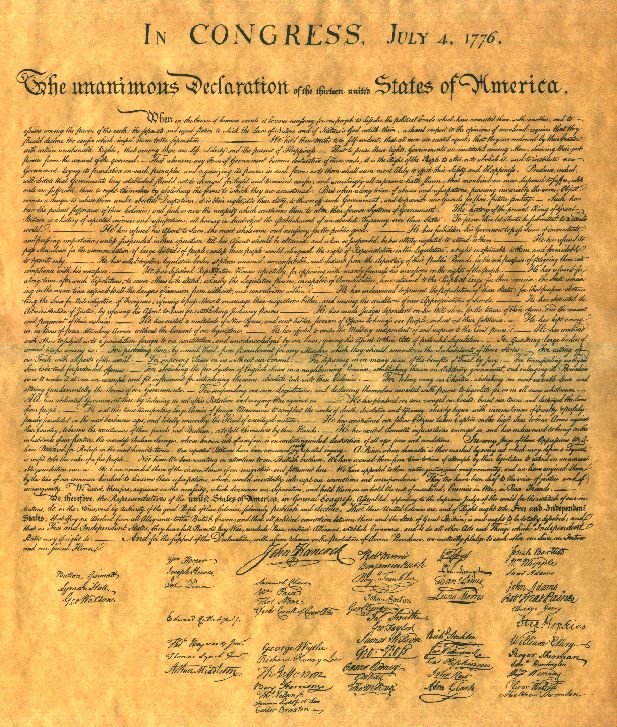An aging parchment of paper holds on a single page the miracle and incalculable power of free will. The story is well known to those interested in history and the birth of this nation. The declaration stood as the culmination of great debates and impassioned arguments of the representatives of the Continental Congress assembled for the purpose of determining what should be the relationship of a government to its people, and what events could make those bonds irreconcilable. The 56 signers of the Declaration of Independence were completely aware of what they had crafted and were asking of themselves. It was every bit a radical reworking of the role of the individual in defining his own destiny, and in concrete terms, a death warrant for each of the iron men who put their signature on the document. John Adams, the Massachusetts lawyer who perhaps more than any other delegate forged the will to move toward independence, recognized the immensity of the signing day, expressing to his wife Abigail in a letter the next day, ” Yesterday the greatest question was decided that was ever debated in America; and a greater perhaps never was, nor will be, decided among men. A resolution was passed without one dissenting colony, that ‘ these United Colonies are, and of right ought to be, free and independent States’.”
The struggles of conscience and philosophy that led to the fateful decision of the signers was born in the perfect storm of the unique position, isolation, and bounty of the North American continent, the special mettle of the individuals who risked all to forge a future in a foreboding wilderness, and the power of the era of the Enlightenment to instill for the first time the dominance of individual intellect in interpreting the natural world and each individual’s place in it. Philosophers like John Locke reflected on each individual being born with a clean conscious slate, a tabula rosa, upon which through life is intimately shaped by the individual’s unique experience, molded by sensation and reflection. Locke’s man could gradually accumulate experiences and educations, and through the power of self reflection and self realization fashion his own destiny. Locke’s view was the kindle that ignited intellectual fire in men like Adams and Thomas Jefferson. A self realized individual did not require circumstances of birth or the direction of a king to maximize his potential. If indeed all individuals were born with the same blank slate regardless of class, birthright, limitation of original sin, or other distinction, then by logical outgrowth, at creation, all men are equal, and the resultant inequalities are a consequence of each individual’s experiences and reactions to his unique world view through life. The perfect environment to bring this radical philosophy to fruition would be an isolated continent with unbounded potential available equal to all with the prescience to see its potential and the perseverance to overcome its challenge.
The entire cauldron of colony versus mother country, old world versus new, king versus subject, individual versus collective, and free will versus original sin was encapsulated in a single sentence by the brilliant author of the declaration tome, Thomas Jefferson:
We hold these truths to be self evident, that all men are created equal, that they are endowed by their Creator with certain unalienable rights, that among these are Life, Liberty, and the Pursuit of Happiness.
Upon such words the bedrock of 236 years of the great experiment in freedom and self determination known as the United States of America has flourished. The further expression of Jefferson of the natural consequence of these rights, that government exists and derives its powers only by the consent of the governed, has led to the greatest prosperity and personal freedom that the world has ever known.
On the 236th anniversary of the founding of this country, RAMPARTS expresses undying gratitude to the brilliant and courageous men who took the great leap into the unknown in July, 1776, and every man and women who since has participated in the building of this nation, propagated its message, and defended its principles. July 4th, 2012 is additionally the second birthday of RAMPARTS OF CIVILIZATION , and through over 275 essays, hundreds of thousands of words, and the ongoing and appreciated support its hardy band of readers has persevered through the trials and challenges of maintaining those ramparts through all of life’s intruding pressures. Happy Birthday, America, and Happy Birthday RAMPARTS! On this glorious 4th of July, we will continue to defend the ramparts of western civilization inspired by this nation’s magnificent example, and strengthened by the words of our hero John Adams invoking the credo of freedom to his son John Quincy in a letter in 1816:
Let the human mind loose. It must be loose. It will be loose. Superstition and dogmatism cannot confine it.

Fantastic. Thanks for a great read.